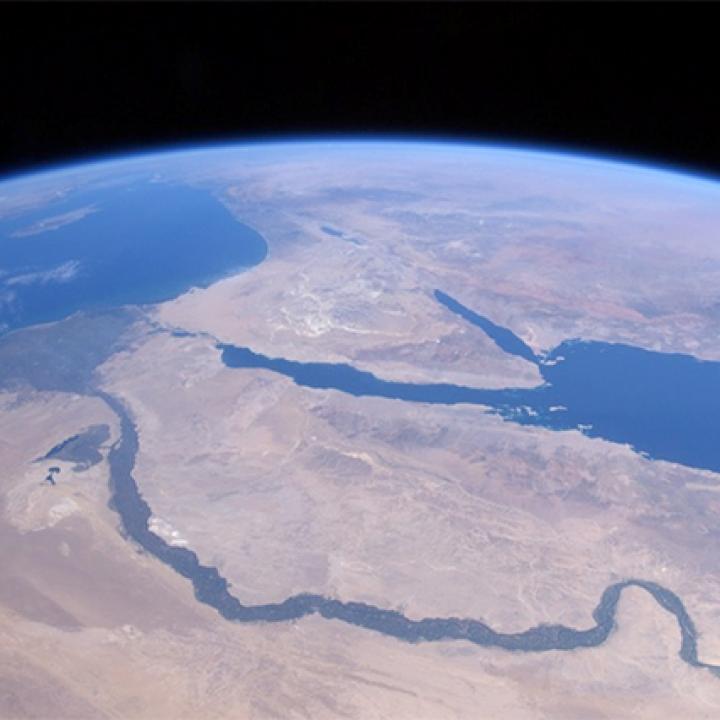
- Policy Analysis
- Fikra Forum
Egypt, Israel, and Nile Water Conspiracies

Egyptian media accusations regarding Israel’s role in Ethiopian Dam talks indicate Egyptian perspectives, and how they are utilized to fulfill the country's strategic aims.
The Israeli embassy in Cairo published a tweet on July 18 denying accusations circulated in Egyptian media stating that Jerusalem is threatening Egyptian national security with their involvement in the Grand Ethiopian Renaissance Dam talks. Replying to the initial tweet that denied Israeli interference, the embassy clarified that Israel generates enough water through agricultural processing and seawater desalination and expressed Jerusalem’s willingness to cooperate with Egypt on future water procurement projects. This is not the first time the Israeli embassy in Cairo has found itself dealing with such allegations. In October 2019, it had to refute claims that its defense systems were being used to protect the Renaissance dam.
The response of Cairo’s elites to the statement have been mainly negative. Egyptian parliamentarian Mustafa Bakry accused the Israeli ambassador of trying to hide her country’s suspicious role and justified his argument in a tweet referencing a 2016 visit of former prime minister Benjamin Netanyahu to Ethiopia, where Israel expressed support for increased Nile water shares from Ethiopia. Widely viewed MBC anchor Amr Adib said in his show “The Story” that if the Israelis swore that they have nothing to do with the Nile water, he would not believe them. However, while the prevailing tone in Cairo is to remain suspicious of Israel when it comes to the Nile, former Egyptian diplomat and current president of Alexandria Library Mustafa el-Feki nevertheless expressed a different opinion, arguing instead that Cairo should utilize its regional influence to open direct channels with Israel and seek assistance to maximize leverage over Ethiopia.
Historically, Egyptian elite circles have been obsessed with the idea that Israel is trying to “steal” the Nile water. Proponents of this narrative argue the Torah identifies Israel’s correct borders as between the Nile River and the Euphrates River. A popular, but unsubstantiated justification for this argument claims the entrance to the Knesset bears an inscription with this specific Torah excerpt. Last April, a report by General Hamdy al-Batran published by Dostor newspaper explained that Israeli interest in the Nile can be linked back to 1903, when Theodore Herzl proposed to the British government a plan for the transferal of water from the Nile through Suez Canal and then into Palestine.
Notably, there was an offer made by President Anwar Sadat to the Israelis back during 1979 talks when Sadat suggested that Egypt “pipe fresh water from the Nile River across the Sinai Peninsula to the Negev Desert”, according to this archived Washington Post article. Indeed, this issue has proven to crop up periodically as former President Hosni Mubarak grappled with supposed Israeli interest in the Nile. In 1997, during the opening ceremony of the El Salam Canal, Mubarak announced it is purely an Egyptian project and water is too scarce to be shared with others. It was an indirect answer to his domestic critics who were claiming that he would sell the Nile water to Israel through the Sinai based project.
There are several reasons why such accusations may be coming to the fore now. First, there has been a noticeable decline of Egyptian hegemony in Africa in the past two decades, while Israeli influence has grown. Veteran Egyptian diplomat Ahmed Abo el-Gheit explained this in his 2012 book My Testimony, where he argued limited financial resources are a major hinderance to Egypt’s ability to compete in the African sphere.
Egyptians likewise understand that the lack of development in sub-Saharan African countries has opened the door for an Israeli presence through guidance and support for other countries because of Israel's technological and technical expertise. Addis Ababa and Jerusalem have enjoyed close relations since 1990s, with increased cooperation in fields such as agriculture, security, and public health. This relationship has raised suspicions in Egyptian policy circles. According to a 2019 report by the Egyptian Center for Strategic Studies, a key finding was that most Israeli investment and agricultural companies operating in Ethiopia have an intelligence background.
Third, the Sisi regime is feeling the pressure from ongoing public frustration over the GERD issue. Specifically, the government is struggling to address the widespread nationalist sentiment generated by a perception that the Egyptian government has failed in the repeated negotiations determining how quickly Ethiopia will fill the dam. These tensions make Israel an easy scapegoat to justify diplomatic setbacks, since there is a popular perception of Israeli actions being characterized by bad intentions. It likewise opens the door for the strategy of confirmation bias—many Egyptians already see Israel negatively, and narratives that cement these feelings can become quite popular, regardless of veracity. Such narratives were embraced during Mubarak’s time, and the Sisi regime is not likely to change this formula for quelling civil discontent in the near-term.
This latest issue in Egyptian-Israeli relations is another indication of how the lack of progress towards normalization and a lack of opportunity for cross-cultural engagement has perpetuated a negative view of Israel amongst the Egyptian people. The fact that Egyptians believe Israel is looking for other water sources despite the country having water security reflects an ignorance about Israeli priorities in Egypt.
This ignorance stems from a lack of contact, including the fact that visits to Israel are banned by the Egyptian government and sources of information available about their Jewish neighbor are largely filtered through biased Arabic sources, which focus their coverage of Israel through the prisms of the Palestinian conflict or military and intelligence affairs. If Egyptians continue to have these sources color their perception, conspiracy theories like these will prove easy targets to redirect popular frustrations over contentious issues like water.



